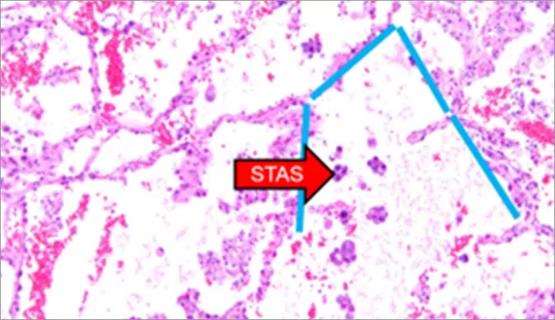New review published in Cancers suggests a synergistic benefit

An epidermal growth factor receptor (EGFR)-tyrosine kinase inhibitor (TKI) may act synergistically when used concurrently with stereotactic radiosurgery (SRS) to potentially improve outcomes in patients with brain metastases from non-small cell lung cancer (NSCLC) with an EGFR mutation.
Advertisement
Cleveland Clinic is a non-profit academic medical center. Advertising on our site helps support our mission. We do not endorse non-Cleveland Clinic products or services. Policy
According to a study published in Cancers, a retrospective review of 239 patients with EGFR mutations and NSCLC brain metastases showed that median overall survival was greatest among those patients treated with both an EGFR-TKI and SRS compared with SRS only, although this difference was not statistically significant. Patients treated with whole brain radiation, with or without SRS, had a much shorter median overall survival than those who received SRS as part of their treatment protocol.
The review “definitely showed that patients who are EGFR-positive certainly benefit from the use of SRS, and that EGFR-directed therapies could also provide additional benefit, not only for just local control, but also control of brain metastases,” says study co-author Samuel T. Chao, MD, a radiation oncologist at the Rosa Ella Burkhart Brain Tumor and Neuro-oncology Center at Cleveland Clinic’s Taussig Cancer Institute. “What I mean by that is that adding an EGFR-TKI to SRS not only prevents development of new disease in the areas that receive SRS but it can also prevent development of new disease elsewhere in the brain. Historically, the standard would have been just SRS as the primary local management for these brain metastases.”
EGFR is mutated in about 40% to 60% of patients with NSCLC. The risk of developing brain metastases is higher in patients with EGFR mutations. Brain metastases in patients with NSCLC have traditionally been treated with SRS, whole-brain radiation and/or surgical resection, and studies have shown that EGFR-mutated NSCLC is highly sensitive to radiation. Although EGFR signaling pathways have proven to be an effective target for EGFR-directed systemic therapies, management of brain metastases with systemic therapies, including first-generation EGFR-TKIs, has been challenging due to poor blood–brain barrier penetration, leading to a low intracranial response rate.
Advertisement
The review included patients diagnosed with NSCLC brain metastases from 2010 to 2019 at a tertiary care center in the U.S. Of the 239 patients with EGFR mutations included, 32 had been treated with whole brain radiation therapy only, 51 received SRS only, 36 received SRS and whole brain radiation only, 18 were given EGFR-TKI in addition to SRS and 29 were given EGFR-TKI with whole brain radiation therapy.
Median overall survival (OS) was 21.73 months for SRS only and 23.63 months for the group that received an EGFR-TKI plus SRS. Median OS was only about 3 months in patients treated with whole brain radiation therapy, with or without SRS, and was 15.5 months among those who received an EGFR-TKI plus whole brain radiation. A multivariable analysis showed significantly better OS in the SRS-only group compared with the whole brain radiation therapy reference group (HR = 0.38; P = 0.017).
“Though our data showed the longest estimated OS for the combination of SRS and EGFR-TKIs, the SRS-only cohort also showed a statistical significance in OS rate. When available, SRS has become the prevailing first-line radiation for brain metastases; however, our data do not definitively conclude that the combination of EGFR-TKI and SRS therapy is superior to the SRS-only cohort,” the authors wrote.
Dr. Chao says that newer EGFR-TKIs that can penetrate the blood-brain barrier, such as osimertinib, may be superior to first- and second-generation EGFR-TKIs in improving outcomes in patients with NSCLC brain metastases with EGFR mutations, but this remains to be proven. “We have to think about how osimertinib might contribute to the control of disease within the brain,” he says. “The biggest question moving forward is, can we avoid using SRS and just use osimertinib because it does have the ability to cross the blood-brain barrier. There has been no randomized study comparing osimertinib alone with SRS plus osimertinib, and without these data, it is difficult to make the leap that we can use osimertinib alone, especially since SRS does provide a high level of control. I believe that such a study would be warranted.”
Advertisement
Advertisement

Treatment assigned FDA review date in June 2025

Cleveland Clinic, the University of Minnesota and University of Cambridge receive $1M grant to develop point-of-care biosensor for early detection and treatment personalization

Hybrid treatment model helps improve cancer care access

Resection, radiotherapy or ablation?

Extent of baseline burden impacts progression-free and overall survival

Quantum computing being studied as a means to help improve predictive performance, accuracy

Young age, solid tumor, high uptake on PET and KRAS mutation signal risk, suggest need for lobectomy

Targeting DNMT1 shows promise in chemotherapy- and immunotherapy-resistant SCLC